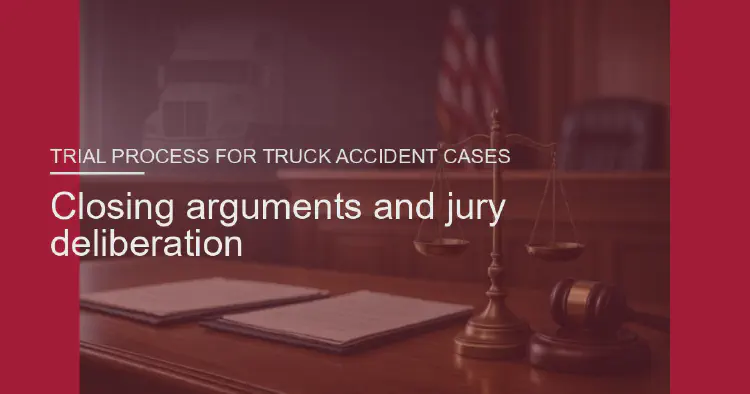Closing arguments and jury deliberation
Closing arguments are the final opportunity for attorneys to address the jury before deliberation begins. In truck accident trials, this stage ties together evidence, testimony, and legal standards to persuade jurors toward a favorable verdict.
- Truck Accident Law Team
- 2 min read
Article 6 of 6 in Trial Process for Truck Accident Cases/

Closing Arguments and Jury Deliberation in Truck Accident Trials
Purpose of Closing Arguments
- Summarize key evidence presented during trial.
- Reinforce each side’s theory of the case.
- Appeal to the jury’s sense of justice and fairness.
- Unlike opening statements, attorneys may argue and draw conclusions.
Plaintiff’s Closing Argument
- Highlights evidence of the truck driver’s or company’s negligence.
- Reviews expert testimony on injuries, damages, and regulations.
- Emphasizes the impact on the victim’s life and requests specific compensation amounts.
- Reminds jurors of the defendant’s responsibility under the law.
Defense’s Closing Argument
- Attempts to create doubt about the plaintiff’s claims.
- Points to alternative causes such as weather, road conditions, or other drivers.
- Challenges credibility of witnesses or experts.
- Argues for reduced damages or complete dismissal.
Jury Instructions
- After closing arguments, the judge provides jurors with legal instructions.
- Defines negligence, burden of proof, and how to calculate damages.
- Guides jurors in applying the law to the facts presented.
Jury Deliberation
- Jurors meet in a private room to discuss the case.
- Select a foreperson to lead discussions.
- Review evidence, weigh credibility of witnesses, and apply jury instructions.
- Work toward a unanimous or majority verdict, depending on state law.
Verdict
- Jury announces findings on liability and damages.
- The verdict may include compensatory damages, and in some cases, punitive damages.
Legal Importance
- Closing arguments shape the final impression jurors take into deliberations.
- Jury deliberations translate weeks of evidence and argument into a binding verdict.
- The outcome determines whether victims receive compensation and how much.
Summary: Closing arguments allow attorneys to make their final persuasive appeal, while jury deliberation determines the verdict. Together, these stages mark the culmination of a truck accident trial and decide liability and damages.
You might also like:
- Tags:
- Punitive Damages
- Expert Testimony
- Legal Importance
- Truck Driver
- Road Conditions
- Liability Damages
- State Law
- Accident Trials
- Jury Instructions
- Depending State
- Key Evidence
- Weather Road
- Compensatory Damages
- Victims Receive
- Attorneys Argue
- Opening Statements
- Receive Compensation
- Evidence Presented
- Truck Accident Trials
- Weather Road Conditions
- Victims Receive Compensation
- Accident Trials Purpose
- Cases Punitive Damages
- Decide Liability Damages
- Depending State Law
- Include Compensatory Damages
- Truck Accident Trial